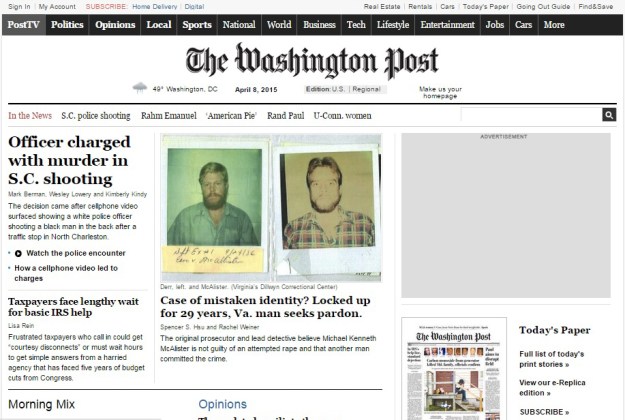Dear President McConnell,
First, please accept my condolences on the loss of your friend and former colleague,Rev. Clementa Pinckney, as well as our mutual colleague, College of Charleston librarian Cynthia Hurd. Their deaths, and the deaths of Rev. Sharonda Singleton, Myra Thompson, Tywanza Sanders, Ethel Lee Lance, Rev. Daniel L. Simmons Sr., Rev. DePayne Middleton-Doctor, and Susie Jackson at the hands of a white supremacist terrorist are a tragedy that we can hardly imagine. These people were giants in our community, and we feel the collective pain of their absence, but I also know the loss is particularly personal to you.
I am writing to you because you are the leader of my college and one of the most influential people in the state of South Carolina.
I am asking you to support the removal of the Confederate battle flag from the South Carolina Capitol grounds.
I know that you are a student and practitioner of the principles of servant leadership, as demonstrated during your time in the legislature, and over the past year as you’ve guided College of Charleston. You’re well aware of the controversy surrounding your initial selection as our president, and yet, in a short time, by listening to others and meeting the needs of those you lead, you’ve convinced many that you were the right choice all along.
You are now serving a different constituency than in 2000, when, as a member of the state legislature, you helped broker the compromise that removed the flag from the capitol dome to the Confederate memorial on the grounds. Then, you were looking for a solution that would defuse a politically volatile situation. Even as you declared, “Many of us who love the flag would have preferred it stayed on the dome,” you recognized that its removal was necessary.
It is clear that the legislature will soon be tasked to consider the removal of the flag from the grounds entirely. A number of your Republican former colleagues have already expressed their desire to retain the flag in its place of honor. Many say they are “undecided” or have yet to commit to a position. A statement from you in support of removal may help prevent the kind of contentious battle we do not need at this time.
If the Confederate battle flag once symbolized “heritage, not hate,” the actions of the white supremacist terrorist who proudly posed with the flag, as well as symbols of Apartheid South Africa, before murdering nine Black people in the midst of a Bible study, have rendered this distinction meaningless.
Perhaps we can argue that the flag was misappropriated by the white supremacist terrorist, the same way it was misappropriated by those who originally hoisted the flag to the top of the S.C. Capital dome in defiance of the Civil Rights Movement and support of segregation in 1961.
I accept the private and deep feelings of pride and honor absent any racial animosity that many people associate with the flag. I can respect them even as I do not share them.
But those private feelings no longer outweigh the public symbolism of a flag that for many declares them as inherently unequal. It is a flag that has been adopted by an internal terrorist enemy that we must band together to defeat.
Sadly, President McConnell, the picture of you from 1999, showing you posing in front of the flag at your family’s old memorabilia store, for me, is now indelibly associated with this heinous act. I can no longer explain it to people who ask me about College of Charleston. It is inconsistent with the pride I feel for this place and my respect for your leadership this past year.
This is, in many ways, unfair. Signaling hate is obviously not your intention. You have declared yourself a champion of equality and diversity. In fact, one of your first acts as president was to take concrete steps to increase diversity at College of Charleston. You have been walking your talk as a leader.
I hope you agree it is time to take another step.
That which we could not imagine in 1999 or 2000 has now happened in 2015.
Though, if we really search our hearts, we know that these murders were not unimaginable at all, but rather wholly predictable, inevitable even, when we refuse to confront these wounds. The white supremacist terrorist spoke openly of his plans. In his twisted mind, these murders were justified.
He found comfort in this flag, and believed its public display meant that he spoke for many.
We’ve had so many powerful gestures of healing in our community over the last week, proving that the white supremacist terrorist does not speak for us, but we cannot let these moments of solidarity distract us from these larger issues.
Yes, the flag is “just” a symbol, but it is now an irrefutably toxic one. How could we conclude otherwise?
I understand that you believe discussion of the flag should wait until after the victims have been laid to rest. I disagree. While those services help us heal, the severity of the crime also demands justice, the swifter the better. Each day the flag flies on the capitol grounds it may give sustenance to others who share the white supremacist terrorist’s twisted ideology.
This is justice denied. In your most recent message to the college you said, “The College of Charleston will need to be the center for our collective healing.” Removing the flag is only one small step, but it is necessary.
President McConnell, you have the wisdom, and spirit, and influence to help heal your college community and your state.
Please support the removal of the flag from the S.C. State Capitol grounds.
Respectfully,
John Warner
Visiting Instructor
College of Charleston





























